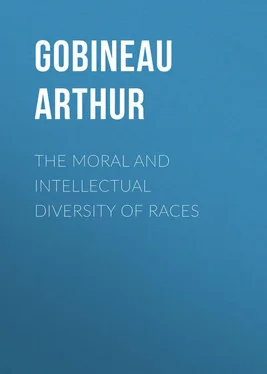Arthur Gobineau - The Moral and Intellectual Diversity of Races
Здесь есть возможность читать онлайн «Arthur Gobineau - The Moral and Intellectual Diversity of Races» — ознакомительный отрывок электронной книги совершенно бесплатно, а после прочтения отрывка купить полную версию. В некоторых случаях можно слушать аудио, скачать через торрент в формате fb2 и присутствует краткое содержание. Жанр: История, foreign_antique, foreign_prose, на английском языке. Описание произведения, (предисловие) а так же отзывы посетителей доступны на портале библиотеки ЛибКат.
- Название:The Moral and Intellectual Diversity of Races
- Автор:
- Жанр:
- Год:неизвестен
- ISBN:нет данных
- Рейтинг книги:4 / 5. Голосов: 1
-
Избранное:Добавить в избранное
- Отзывы:
-
Ваша оценка:
- 80
- 1
- 2
- 3
- 4
- 5
The Moral and Intellectual Diversity of Races: краткое содержание, описание и аннотация
Предлагаем к чтению аннотацию, описание, краткое содержание или предисловие (зависит от того, что написал сам автор книги «The Moral and Intellectual Diversity of Races»). Если вы не нашли необходимую информацию о книге — напишите в комментариях, мы постараемся отыскать её.
The Moral and Intellectual Diversity of Races — читать онлайн ознакомительный отрывок
Ниже представлен текст книги, разбитый по страницам. Система сохранения места последней прочитанной страницы, позволяет с удобством читать онлайн бесплатно книгу «The Moral and Intellectual Diversity of Races», без необходимости каждый раз заново искать на чём Вы остановились. Поставьте закладку, и сможете в любой момент перейти на страницу, на которой закончили чтение.
Интервал:
Закладка:
In the latter stages of the Roman empire, the armies had acquired such undue political preponderance, that from the emperor, who inevitably was chosen by them, down to the pettiest governor of a district, all the functionaries of the government issued from the ranks. They had sprung from those popular masses, of whose passionate attachment to their faith I have already spoken, and upon attaining their elevated stations, came in contact with the former rulers of the country, the old distinguished families, the municipal dignitaries of cities, in fact those classes who took pride and delight in sceptical literature. At first there was hostility between these latter and the real rulers of the state, whom they would willingly have treated as upstarts, if they had dared. But as the court gave the tone, and all the minor military chiefs were, for the most part, devout and fanatic, the sceptics were compelled to disguise their real sentiments, and the philosophers set about inventing systems to reconcile the rationalistic theories with the state religion. This revival of pagan piety caused the greater number of the persecutions. The rural populations, who had suffered their faith to be outraged by the atheists so long as the higher classes domineered over them, now, that the imperial democracy had reduced all to the same level, were panting for revenge; but, mistaking their victims, they directed their fury against the Christians. The real sceptics were such men as King Agrippa, who wishes to hear St. Paul 45from mere curiosity; who hears him, debates with him, considers him a fool, but never thinks of persecuting him because he differs in opinion; or Tacitus, the historian, who, though full of contempt for the believers in the new religion, blames Nero for his cruelties towards them.
Agrippa and Tacitus were pagan sceptics. Diocletian was a politician, who gave way to the clamors of an incensed populace. Decius and Aurelian were fanatics, like the masses they governed, and from whom they had sprung.
Even after the Christian religion had become the religion of the state, what immense difficulties were experienced in attempting to bring the masses within its pale! So hopeless was in some places the contest with the local divinities, that in many instances conversion was rather the result of address, than the effect of persuasion. The genius of the holy propagators of our religion was reduced to the invention of pious frauds. The divinities of the groves, fields, and fountains, were still worshipped, but under the name of the saints, the martyrs, and the Virgin. After being for a time misdirected, these homages would finally find the right way. Yet such is the obstinacy with which the masses cling to a faith once received, that there are traces of it remaining in our day. There are still parishes in France, where some heathenish superstition alarms the piety, and defies the efforts of the minister. In Catholic Brittany, even in the last centuries, the bishop in vain attempted to dehort his flock from the worship of an idol of stone. The rude image was thrown into the water, but rescued by its obstinate adorers; and the assistance of the military was required to break it to pieces. Such was, and such is the longevity of paganism. I conclude, therefore, that no nation, either in ancient or modern times, ever abandoned its religion without having duly and earnestly embraced another, and that, consequently, none ever found itself, for a moment, in a state of irreligion, which could have been the cause of its ruin.
Having denied the destructive effects of fanaticism, luxury, and immorality, and the political possibility of irreligion, I shall now speak of the effects of bad government. This subject is well worthy of an entire chapter.
CHAPTER III.
INFLUENCE OF GOVERNMENT UPON THE LONGEVITY OF NATIONS
Misgovernment defined – Athens, China, Spain, Germany, Italy, etc. – Is not in itself a sufficient cause for the ruin of nations.
I am aware of the difficulty of the task I have undertaken in attempting to establish a truth, which by many of my readers will be regarded as a mere paradox. That good laws and good government exert a direct and powerful influence upon the well-being and prosperity of a nation, is an indisputable fact, of which I am fully convinced; but I think that history proves that they are not absolute conditions of the existence of a community; or, in other words, that their absence is not necessarily productive of ruin. Nations, like individuals, are often preyed upon by fearful diseases, which show no outward traces of the ravages within, and which, though dangerous, are not always fatal. Indeed, if they were, few communities would survive the first few years of their formation, for it is precisely during that period that the government is worst, the laws most imperfect, and least observed. But here the comparison between the body political and the human organization ceases, for while the latter dreads most the attack of disease during infancy, the former easily overcomes it at that period. History furnishes innumerable examples of successful contest on the part of young communities with the most formidable and most devastating political evils, of which none can be worse than ill-conceived laws, administered in an oppressive or negligent manner. 46
Let us first define what we understand by bad government. The varieties of this evil are as various as nations, countries, and epochs. It were impossible to enumerate them all. Yet, by classing them under four principal categories, few varieties will be omitted.
A government is bad, when imposed by foreign influence. Athens experienced this evil under the thirty tyrants. Yet she shook off the odious yoke, and patriotism, far from expiring, gained renewed vigor by the oppression.
A government is bad, when based upon absolute and unconditional conquest. Almost the whole extent of France in the fourteenth century, groaned under the dominion of England. The ordeal was passed, and the nation rose from it more powerful and brilliant than before. China was overrun and conquered by the Mongol hordes. They were ejected from its territories, after having previously undergone a singular transformation. It next fell into the hands of the Mantchoo conquerors, but though they already count the years of their reign by centuries, they are now at the eve of experiencing the same fate as their Mongol predecessors.
A government is especially bad, when the principles upon which it was based are disregarded or forgotten. This was the fate of the Spanish monarchy. It was based upon the military spirit of the nation, and upon its municipal freedom, and declined soon after these principles came to be forgotten. It is impossible to imagine greater political disorganization than this country represented. Nowhere was the authority of the sovereign more nominal and despised; nowhere did the clergy lay themselves more open to censure. Agriculture and industry, following the same downward impulse, were also involved in the national marasmus. Yet Spain, of whom so many despaired, at a moment when her star seemed setting forever, gave the glorious example of heroic and successful resistance to the arms of one who had hitherto experienced no check in his career of conquest. Since that, the better spirit of the nation has been roused, and there is, probably, at this time, no European state with more promising prospects, and stronger vitality. 47
A government is also very bad, when, by its institutions, it authorizes an antagonism either between the supreme power and the nation, or among the different classes of which it is composed. This was the case in the Middle Ages, when the kings of France and England were at war with their great vassals, and the peasants in perpetual feud with the lords. In Germany, the first effects of the liberty of thought, were the civil wars of the Hussites, Anabaptists, and other sectaries. Italy, at a more remote period, was so distracted by the division of the supreme authority for which emperor, pope, nobles, and municipalities contended, that the masses, not knowing whom to obey, in many instances finished by obeying neither. Yet in the midst of all these troubles, Italian nationality did not perish. On the contrary, its civilization was at no time more brilliant, its industry never more productive, its foreign influence never greater.
Читать дальшеИнтервал:
Закладка:
Похожие книги на «The Moral and Intellectual Diversity of Races»
Представляем Вашему вниманию похожие книги на «The Moral and Intellectual Diversity of Races» списком для выбора. Мы отобрали схожую по названию и смыслу литературу в надежде предоставить читателям больше вариантов отыскать новые, интересные, ещё непрочитанные произведения.
Обсуждение, отзывы о книге «The Moral and Intellectual Diversity of Races» и просто собственные мнения читателей. Оставьте ваши комментарии, напишите, что Вы думаете о произведении, его смысле или главных героях. Укажите что конкретно понравилось, а что нет, и почему Вы так считаете.












